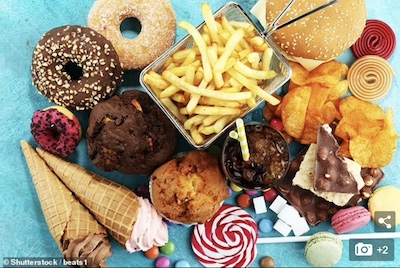
Overeating ‘is NOT the primary cause of obesity’
Overeating 'is NOT the primary cause of obesity': Scientists claim eating foods high in processed sugars is the real cause of a bulging waistline
- Eating food with highly processed carbs is the main driver of obesity
- These foods drive fat storage, hunger levels and weight gain, researchers claim
- Focus should move to what people eat, rather than cutting calories, they said
Overeating is not the main cause of obesity, scientists have claimed.
They say that consuming the wrong types of foods — rather than too much — is the real driver of one of the biggest health crises in the West.
The team of American researchers are calling for a complete rethink to public health messaging on obesity, with the focus now to be on foods high in processed sugar.
They say that snacks such as sweets, fizzy drinks and sugary cereals trigger hormonal imbalances that cause hunger spikes and weight gain.
Dr David Ludwig, an endocrinologist at Boston Children's Hospital, said it was time to scrap the 'century-old' idea that obesity is caused by 'consuming more energy than we expend'.
Around four in 10 American adults and three in 10 adults Britons are obese, which puts them at higher risk of heart disease, stroke, type two diabetes and cancer.
The report comes as the UK has been chosen by the World Health Organization to work with countries across Europe to reduce national sugar intake.
Despite decades of public health messaging telling people to eat less and exercise more, rates of obesity and obesity-related diseases have steadily risen.
In their review, published in the The American Journal of Clinical Nutrition, researchers suggest a 'carbohydrate-insulin model' better explains obesity and weight gain and can help with effective and long-lasting solutions.
The model was first considered in the early 1900s, but there is a growing body of evidence in support of it, the experts said.
To address soaring obesity rates in the West, there needs to be a better understanding of not just how much food a person is eating, but what kind of food.
'With its assertion that all calories are alike to the body, the energy balance model misses this critical piece of the puzzle,' the researchers said.
Eating highly-processed carbohydrates increases the body's insulin secretion and suppresses glucagon secretion.
This tells fat cells to store more calories, leaving fewer calories to fuel muscles and tissues.
The brain then thinks the body is not getting enough energy, leading to feelings of hunger.
It could also slow down the body's metabolism — the chemical process of turning food into energy — to conserve fuel, meaning a person stays hungry despite gaining fat.
Using the carbohydrate-insulin model in public messaging would have 'radical implications for weight management and obesity treatment', they added.
It would move away from telling people to eat less 'a strategy which usually doesn't work in the long run' and sets a move focus to what people eat.
Dr Ludwig, who is also a nutrition professor at Harvard Medical School, said 'reducing consumption of the rapidly digestible carbohydrates that flooded the food supply during the low-fat diet era lessens the underlying drive to store body fat.
'As a result, people may lose weight with less hunger and struggle.'
It comes as the UK has been asked by the HO to work with 50 countries across the EU to share its knowledge in reducing sugar levels in food to tackle obesity rates.
Health and Social Care Secretary, Sajid Javid said: 'It’s a testament to the success of our pioneering work in the UK to help people eat more healthily that we have been chosen to lead this programme.
'We will work closely with our European partners to challenge the food industry to reduce sugar and calories in its products – reducing obesity, relieving pressure on health services and increasing our resilience to Covid and any future pandemics.'
WHAT SHOULD A BALANCED DIET LOOK LIKE?

• Eat at least 5 portions of a variety of fruit and vegetables every day. All fresh, frozen, dried and canned fruit and vegetables count
• Base meals on potatoes, bread, rice, pasta or other starchy carbohydrates, ideally wholegrain
• 30 grams of fibre a day: This is the same as eating all of the following: 5 portions of fruit and vegetables, 2 whole-wheat cereal biscuits, 2 thick slices of wholemeal bread and large baked potato with the skin on
• Have some dairy or dairy alternatives (such as soya drinks) choosing lower fat and lower sugar options
• Eat some beans, pulses, fish, eggs, meat and other proteins (including 2 portions of fish every week, one of which should be oily)
• Choose unsaturated oils and spreads and consuming in small amounts
• Drink 6-8 cups/glasses of water a day
• Adults should have less than 6g of salt and 20g of saturated fat for women or 30g for men a day
Source: NHS Eatwell Guide
Article source: https://www.dailymail.co.uk/health/article-9986281/Overeating-NOT-primary-cause-obesity-Scientists-claim.html